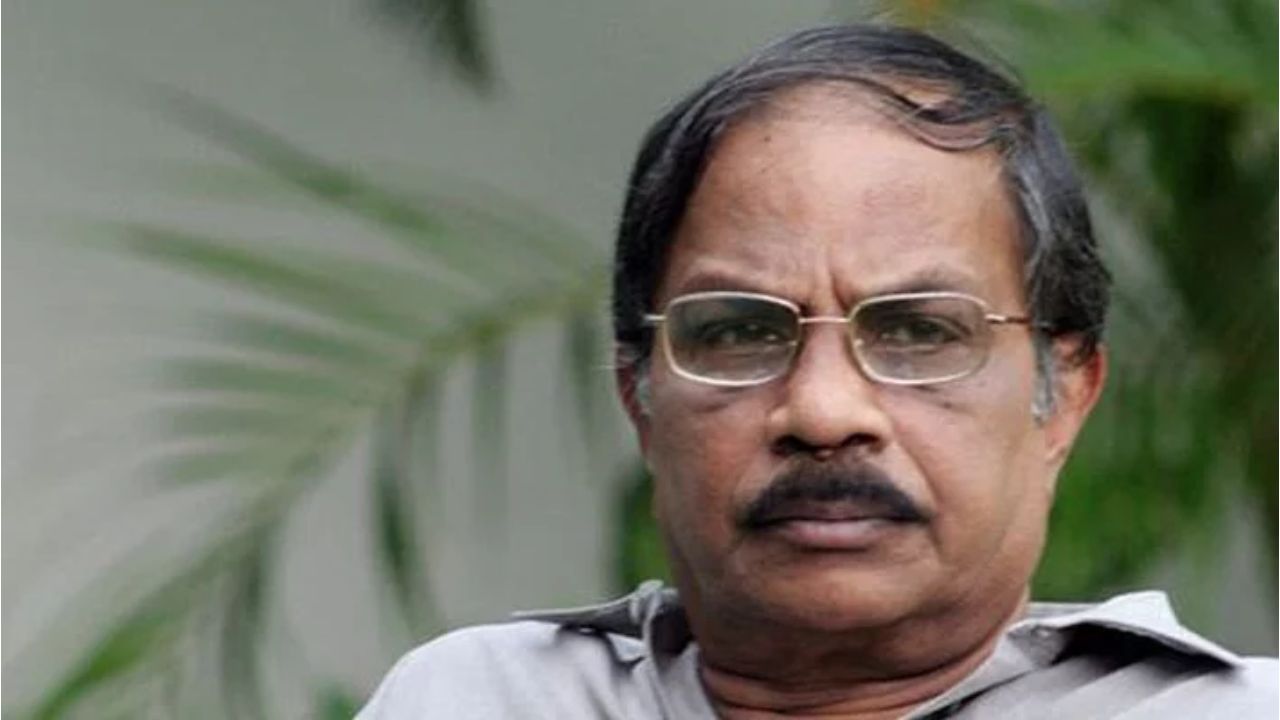M. T. Vasudevan Biography: From 10 to 14 July, Mathrubhumi will host a special event at KP Kesava Menon Hall in Kozhikode to honour the 90th birthday of the legendary author MT Vasudevan Nair. The purpose of the event is to recognise the writer-turned-director, who also served as editor of Mathrubhumi Illustrated Weekly for many years.
M. T. Vasudevan Biography
Childhood and family
Vasudevan was born in 1933 in Kudallur, a small village in Anakkara panchayat in Pattambi Taluk at the northwesternmost point of Palakkad district, which borders Malappuram district. His birthplace was within the Malabar District of the former Madras Presidency of the British Raj. He was the youngest of T. Narayanan Nair and Ammalu Amma’s four offspring. His father was in Ceylon, and he spent his formative years in Kudallur and at his father’s home in Punnayurkulam, a village in the present-day Thrissur district. He attended Malamakkavu Elementary School and Kumaranelloor High School for his education.
When he entered college in 1949, he was advised to choose the science stream because it was believed that a science degree would lead to employment more quickly than other degrees. In 1953, he graduated with a degree in chemistry from Victoria College, Palakkad. He taught mathematics at Pattambi Board High School and Chavakkad Board High School for more than a year, and he worked at M.B. Tutorial College, Palakkad, between 1955 and 1956. Before joining Mathrubhumi Weekly as a subeditor in 1957, he spent a few weeks working as a gramasevakan at a block development office in Taliparamba, Kannur.
MT has had two marriages. In 1965, he married the author and translator Prameela. They divorced following eleven years of marriage. Sithara, his daughter from this union, is an executive in the United States. In 1977, he wed dancer Kalamandalam Saraswathy, with whom he shares dancer Aswathy Nair as a daughter. MT resides in Sithara, Kottaram Road, Kozhikode, a neighbourhood named for his eldest daughter.
M. T. Vasudevan Career
MT began writing at a very young age, influenced by his older siblings who contributed to numerous literary journals and by the poet Akkitham Achuthan Namboothiri, who was his high school senior. He began by writing poetry but quickly shifted to writing prose. His first published work was an essay titled “Pracheenabharathathile Vaira Vyavasayam” on the diamond industry of ancient India, which appeared in Keralakshemam, a biweekly published by C. G. Nair from Guruvayoor. 1948 saw the publication of his first story “Vishuvaghosham” in the Madras-based Chitrakeralam magazine.
The story explores the feelings of a boy who is too poor to have firecrackers of his own, as he stands listening to the sounds of firecrackers coming from the houses of the wealthy celebrating the new year festival of Vishu: an overwhelming sense of loss and the painful realisation that this is how things are and are likely to remain. Raktham Puranda Manaltharikal, his first publication, was published in 1952.
In 1954, while MT was a student at Victoria College, Palakkad, his short story “Valarthumrigangal” (Pet Animals) won the World Short Story Competition sponsored by The New York Herald Tribune, Hindustan Times, and Mathrubhumi. It was a short narrative that described the pitiful plight of circus performers. Numerous stories that followed dealt with themes drawn from vastly diverse milieus and contexts, but were universally successful and well-liked.
Jim Jones Biography: Age, Height, Birthday, Family, Net Worth
Film career
M. T. Vasudevan Nair is one of Malayalam cinema’s most renowned and well-respected screenwriters and directors. He has directed seven films and written approximately 54 screenplays. He has won the National Film Award for Best Screenplay four times for the films Oru Vadakkan Veeragatha (1989), Kadavu (1991), Sadayam (1992), and Parinayam (1994), more than anyone else in the category.
In 1965, at the request of producer Shobhana Parameswaran Nair, MT wrote his first screenplay, Murappennu. His short story “Snehathinte Mukhangal” was adapted into the film. The Hindu called it “a well-made film with a compelling plot” and “one of the most significant films in Malayalam cinema’s history.”
MT was the first and preeminent screenwriter in Malayalam to have learned cinema as a distinct visual art with its own language, grammar, and structure before writing screenplays. After he began writing screenplays, Malayali audiences came to recognise film script as a distinct genre with its own unique characteristics. Additionally, M.T. elevated this form of writing to literary status.
Social attention has been garnered by MT’s screenplays for their depiction of the social and cultural crisis in contemporary Kerala. The disintegration of human values and relationships, which causes identity crisis, a sense of loss, dehumanisation, alienation from one’s own environment, etc., has been presented in greater depth by MT than by any other writer. The finest examples are Kanyakumari, Varikkuzhi, Vilkkanundu Swapnangal, Sadayam, Asuravithu, Edavazhiyile Poocha Mindappoocha, Akshrangal, Aalkkoottathil Thaniye, Aaroodam etc. MT’s screenplays are notable for their effective presentation of ecological or geographical factors and elements, utilising the visual possibilities of their depiction.
Another distinctive characteristic is the language used. Some of his screenplays are known for their innovative interpretations of historical figures and events. In his screenplay, for instance, he reinterprets the legends surrounding the popular story of Perumthachan based on his own evaluation of the character. According to Vadakkanpattu (Northern Ballads), Chandu deceived his cousin out of envy for Aaromal’s popularity and talents. However, MT’s Oru Vadakkan Veeragatha presents an alternate version of the same legend, presenting the incident from Chandu’s point of view and implying that Chandu has been gravely wronged by being falsely accused of replacing the rivets.
Nirmalyam, which won the National Film Award for Best Feature Film in 1973, was M. T. Vasudevan Nair’s first film as a director. The film is about a village oracle whose services are no longer required by the community, and whose family begins to disintegrate as a result. In addition to the award-winning Bandhanam, Kadavu, and Oru Cheru Punchiri, MT scripted and directed numerous other films. At the Singapore International Film Festival and the Tokyo International Film Festival, Kadavu won awards. His filmography also features three documentaries and one television series. M. B. Sreenivasan composed the compositions for the 1981 film Valarthumrugangal that he wrote.
M. T. Vasudevan Nair’s Personal Life
MT has had two marriages. In 1965, he married the author and translator Prameela. They divorced following eleven years of marriage. From this union, he has a daughter, Sithara, who is a business executive in the United States. In 1977, he wed performer Kalamandalam Saraswathy, with whom he shares dancer Aswathy Nair as a daughter. MT lives in Sithara, Kottaram Road, Kozhikode, a neighbourhood named after his oldest daughter.
M. T. Vasudevan Nair Honours and Awards
- 1996: Honorary Doctorate conferred by University of Calicut
- Mahatma Gandhi University awarded an honorary doctorate in 1996
- 2005: Padma Bhushan
- 2008: Honorary Doctorate and Literary Awards from Netaji Subhas Open University
- 1958: Kerala Sahitya Akademi Award for Novel – Naalukettu
- 1970: Kendra Sahitya Academy Award – Kaalam
- 1982: Kerala Sahitya Akademi Award for Drama – Gopura Nadayil
- Vayalar Award for Randamoozham in 1985
- 1986: Kerala Sahitya Akademi Award for Story – Swargam Thurakkunna Samayam
- 1993: Odakkuzhal Award – Vanaprastham
- His contributions to Malayalam literature were recognised by the Muttathu Varkey Award in 1994 and the Jnanpith Award in 1995.
- 1998: Padmarajan Award – Kaazhcha
- 2001: Bahrain Keraleeya Samajam Sahithya Award 2003: Lalithambika Antharjanam Smaraka Sahitya Award
- 2005: Kerala Sahitya Akademi Fellowship
- 2005: Mathrubhumi Literary Award 2005: Vallathol Prize
- 2011: Ezhuthachan Award 2011: T. K. Puraskaram
- 2011: Suvarnamudra Award
- 2011: Mayilpeeli Award 2013: Fellowship of the Sahitya Akademi
- Sree Chithira Thirunal Award for 2013
- 2013: K. P. S. Menon Award 2014: Guruvayur Naadha Brahmolesavam Suvarnamudra Award
- 2014: A. R. Raja Raja Varma Award 2014: Kakkanadan Award 2014: Balamani Amma Award
- 2014: The Tata-Landmark Literature Live! Lifetime Achievement Award 2015: The O.M.C.
- 2015: Thakazhi Award




